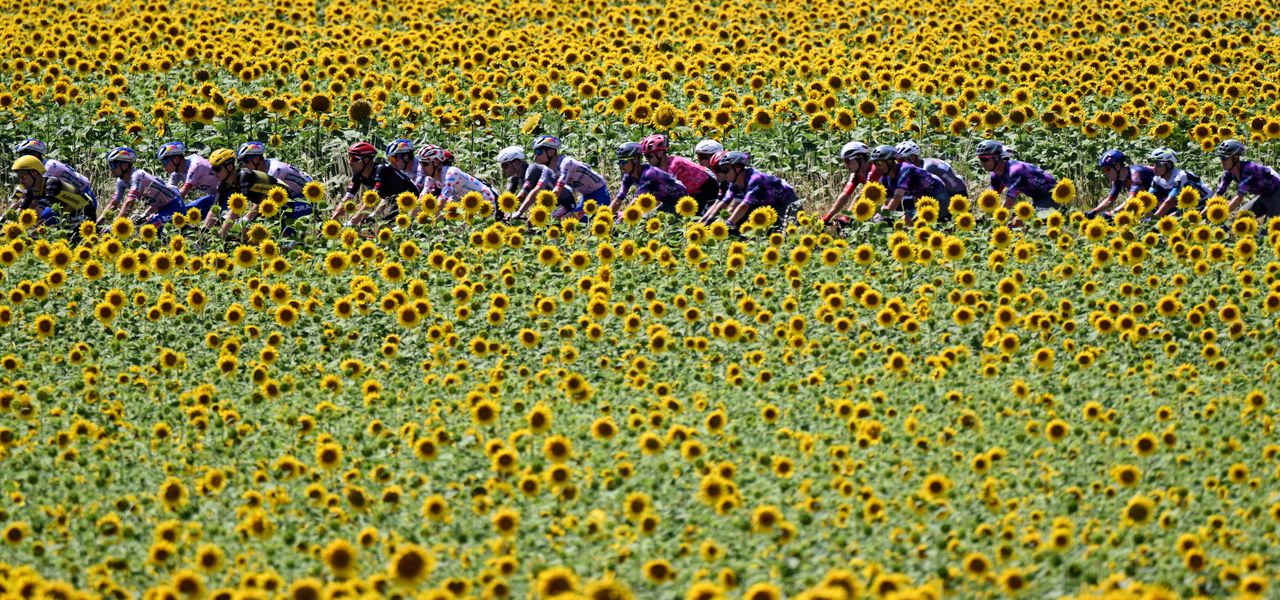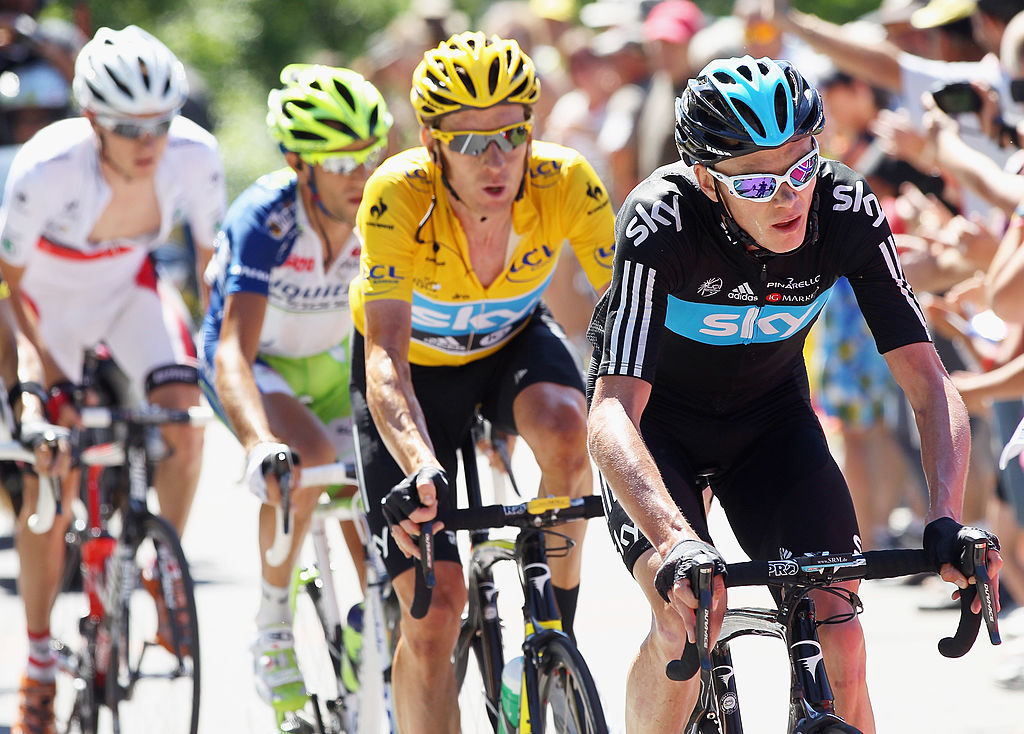
To the uninitiated, the Tour de France may seem to be one man in yellow, chased by 180 other riders trying to take it off him, or win stages. But dig a little deeper and it becomes a race of teams and endless tactics, where the fate of a stage can hinge on the cohesion of the group, as well as the individual ambitions of riders.
The Tour de France is a team event, raced by 23 groups of eight, in most cases all working to support their lead rider. Every rider has a role: sprinters vie for stage-wins; GC contenders race for the yellow jersey, with the rest of the team typically made up of domestiques. These are the workers there to support their leader, sheltering them from the wind, keeping them protected in the peloton and supplied up with water, gels, food and clothes grabbed from the team cars when needed.
But how does a team work together effectively? How do these domestiques, all capable riders at the top of their sport, sacrifice individual victories for the sake of the lead rider and their teams?
Professor Stephen Reicher of the University of St. Andrews uses his theories from the world of psychology to try and better understand how the peloton works. An expert in group psychology and identity formation, cycling also has his heart - just to the back of the video call his bike pops half into frame, leaning gently against a towering bookshelf.
“You get this classic tension between the individual and the group, right?” he tells me, blue eyes sparkling.
“If everybody cycled for themselves, the team would lose. So you have to get people who are prepared to cycle for the collective good of the team, people who are prepared to sacrifice themselves, who are prepared to chase down breaks.
And yet, at the same time, of course, they want to win, because why would you get into cycling if you didn’t? And secondly, to get a contract in the future they’ve got to show themselves and display themselves. So there’s always this tension between the individual good and the collective good.”
The key to winning the race is, of course, in investing in great riders, but it also comes down to the strength of the team - and the careful management needed to strike the right balance is echoed in wider sociological trends.
“People in social sciences talk about the tragedy of the commons.”
The thought experiment calls back to the time when land was held in common. If everyone who shared a claim to that land grazed a single sheep, there would be enough space and grass for all. But if a few people decided to introduce a second sheep, there wouldn’t be enough grass to share, and all the sheep - and the people who kept them - would starve.
“So how do you stop people exploiting the system and acting for their individual interest? And how do you limit their individual interest for the sake of the collective good?
“One of the really big temptations is to be what’s called a “free rider” [/loader]. In other words, everybody else has just one sheep, and you sneak in a second one. You do well, and then more and more people become free riders as a consequence.
“And if you think about it, that tragedy of the commons is that over grazing. And the overuse of resources is, if you like, the key issue in the Tour de France - if everybody just sits in the breakaway, it will collapse.”
At this juncture, Dr Reicher reaches for a battered book, placeholders sticking out of the top, pages lovingly worn. It is 'La Société du Peloton', by the Groupama-FDJ rider and psychologist Guillaume Martin. He turns to the final page and translates its concluding line from French to English:
“Three racers attack, will they manage to organise themselves? Will they allow themselves to be caught by the peloton? The issue is uncertain, but we can be sure that the race will be beautiful.”
Often, the key to a successful breakaway is the commitment of its riders to work together. Will one rider sit on another's wheel and refuse to collaborate, or will they alternate leading riders, allowing the group to conserve energy and form a fierce breakaway? How does a team avoid a “tragedy of the commons?”
“It’s like a game of chess.”
Every day, coalitions between riders of different teams happen. Once in the breakaway, they have a common goal - to stay away from the chasing peloton. However, at one point in the race attacks will inevitably be made, the new goal set towards stage wins. It might come 100km to the end if the distance from the peloton is wide enough, or on a climb, or in the final stretch of a sprint depending on opportunity and rider capabilities.
Sometimes coalitions between riders happen between those with the same nationality, sometimes old favours are called into play during stages, or thrown forwards for future call-ins. Sometimes breakaway team-mates earn the rare honour of a double combativity award like the TotalEnergies riders in this year's Tour. Sometimes team loyalties break down during the races - players go rogue.
“The most famous example was in 1985. Greg LeMond was working for Bernard Hinault to win the Tour de France.”
In 1984, the aging champion Bernard Hinault had broken from Renault to set up his own team: La Vie Claire. The following year, Hinault poached his ex-teammate and current World Champion Greg LeMond, to help him secure his fifth Tour de France victory. LeMond, though arguably the more capable rider of that 1985 Tour, worked for Hinault to secure his record breaking win. However, the following year the American extinguished Hunault’s desires for a sixth victory, taking the win for himself - the first of two more to come.
More recently, Sky teammates Chris Froome and Bradley Wiggins kick started their feud on Stage 11 of the 2012 Tour. Froome rode clear of his teammate in an move criticised by Wiggins, and which threw doubt on the team’s leadership.

The key to ensuring a team works harmoniously is in the ability to cultivate a shared identity, argues Dr. Reicher.
“Good leadership is about creating a sense of “us”.
The success of the group is the ability of the leader to get people to think in group terms - a victory of the group is a victory for me, so I’m not feeling jealous of them, but affirmed by their victory.”
There is no definitive science to how group cohesion can be consistently secured - there are many ways to do this, none of them completely known. But looking at the peloton today, there is one team most clearly working as a strategic whole, according to Dr. Reicher.
“Visma-Lease a Bike. I think most people recognise that Tadej Pogačar (UAE Team Emirates-XRG) is a stronger overall cyclist, but Visma-Lease a Bike [now] have a stronger team - if they attack him, he has to respond to each attack. So the ability of a team like Visma-Lease a Bike is as critical to the tour as the individual legs of Pogačar and Jonas Vingegaard.
“Cycling is just about the only sport where you can have a conversation like this. It’s very much about the team, and the ability of the team to work together, and the ability of people to sacrifice themselves in false attacks, to throw out the opposition which makes all the difference.
I haven’t got the data. I look from the outside, I read it in Cycling Weekly. I have no more insights than you have. But what is quite clear, and what makes it so fascinating, is that this is a conversation we can have that’s critical to what’s going to happen in this tour. If it was just about the strongest rider, quite frankly it would be a bit dull - we’d most likely know the outcome already. But it is so much more than that. It’s about society, too.
Individuals don’t have a chance to defeat the group if they have no coherence as a team. It’s understanding that team process, and how to nurture it, but also that diplomatic process of being able to form those groups on the road that is central to the sport and part of its magic.”







